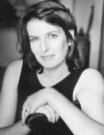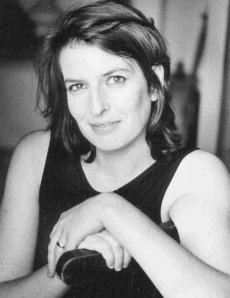AUSTRALIAN POETS AT WORK SERIES 1
Alison Croggon
Selected by Coral Hull

[Above] Photo of Alison Croggon by Jacqueline Mitelman, 2001.
CH: When you look into a mirror, who do you see?
AC: Me, usually.
CH: Name a piece of visual art that has touched you?
AC: Hard to choose, but ... During the Sydney biennale a few years ago I was wandering through feeling very unimpressed by the usual self-referential promo crap, when I wandered into an installation by Anselm Kiefer called "Women of the Revolution". It was the first time I had encountered anything by him.
It was basically an L-shaped room in which were placed at an angle to the wall hospital style beds with lead sheets on them. In the centre of each sheet was a depression; some had some liquid in them, others had nothing but a dried precipitate. Around the feet of these beds were dried vegetable matter, dried sunflower heads and so on, and on the walls were hand written the names of revolutionary women - Madame de Stael and so on. When you turned the corner of the L, what faced you on the far wall was a huge photograph printed on lead, of a lone WW1 soldier trudging through a huge ploughed field. It again was draped with dried flower heads.
What hit me as soon as I walked in was the feeling of it: an overpowering and indescribable sense of absence, a kind of restrained but increasingly poignant sadness. And also, paradoxically, its thereness. The more time I spent there, the more I felt it. It was an incredible piece which changed the arrangement of my braincells somehow, and I'll never forget it.
CH: How are you coping with the US crisis?
AC: I did a special edition of my ezine Masthead at http://au.geocities.com/masthead_2/ which published responses by writers in the immediate aftermath.
CH: What are you working on at the moment?
AC: A number of things. Poems come along when they're ready, which means long periods of poetic silence. I'm in the final agonising throes of a music theatre piece with the composer Michael Smetanin called The White Army, which will probably be done by the Keene/Taylor Theatre Project in Melbourne sometime in 2003. I also write a lot of prose. At the moment I'm about to rewrite a novel for young adults, The Gift, which comes out with Penguin Books next year, and also working on a novel called The Gilded Man, which will take as long as it takes: I'm giving myself five years on that one. Bits of that are published in A Chide's Alphabet, at http://www.chidesplay.8m.com
CH: What is your most memorable childhood incident?
AC: The moment of leaving England for Australia on the Orcades, one of the big P&O liners, when I was six years old. Watching the green water widen between me and everything I knew, with a sense of irrevocable loss.
CH: When did you first fall in love?
AC: When I had my son, Joshua.
CH: What is the hardest thing you've ever had to do?
AC: Raise children.
CH: What is your favourite season and why?
AC: In Melbourne, autumn is the most beautiful season. Its long days of gorgeous golden light, and its sense of respite from the brutality of summer.
| |
Elegy II
IM Douglas Oliver
Weeping cannot be said: intolerable
overswelling, fist without edges,
a hand dreamt beneath water, a mouth
turned down as if it could speak, as if tears
were not what we're made of -
the rain breaking through boughs
its cloudy body, bending dumb grass
under its dewlings, what does it know,
innocent water, swelling the cellulose
membranes, lubricating the bladed mouths
of beetles and ants, all-dimensional
medium of tinily panting cells,
blue breast of the world, our nakedness -
what does it know. Imagine
each molecule scarred by its incarnations, how
infinite sorrow could be - but here, clapped
into air, incandescent droplets, no
curse of consciousness hurts it. So are we
mostly, this lovely matter, drummed
on the tingling skin of sense to this
minute being, which clasps and encloses,
lamped by this motion to self. So small,
but everything there is! Hugging our wounds
we are most human - delight blazes us
to godliness, sheer as broken water,
griefless and borderless, wanting nothing.
If we were but that. The voice
across the twilit grass, calling me home,
inhabits me always, although I scorch
it out of my mind. What hurts most
is remembered beauty, a lost hand stroking
a brush through infant hair, the smell
of mouth in a breathing room. And you,
hand I will never touch, why does your death
prick this skin? All weeping running together
into a single grief, me, huddled small
against infinite flanks. One warmth pressed
on emptiness fades, and all warmth dims,
returning its grief to the brighter moment
where my heavier pulse forces the now
to impure brilliance, neither godly
nor godless, humbled in history, human.
from a longer poem titled: Amplitudes
9
Ego Borago gaudia semper ago_
I borage bring alwaies
courage
Quoth the wise man among his simples
His garden an Empire
Indian Swallow Wort
Which groweth in that part of Virginia, or Norembega, where our
English
men dwelled (intending there to erect a certain colony):
The Floure of the Sun, or the Marigold of Peru, which grow of
themselves without setting or seeding
Also calld Corona Solis or Sol Indianus, others
Chrysanthemum Peruvianum or the Golden Floure of
Peru:
Tabaco, or Henbane of Peru, which cleeres the sight and taketh away
the
spots and webs thereof, being anointed with the juyce bloud-warme:
Apples of Love
That even in the hottest time of Summer
Contain a great coldnesse
Which I leave to every man's censure
Indigenous herbs of wood and hedge of course in abundance
Windfloures Selfheale Madder Teasels and the Pennie Royalle
But unknown to Pliny for example
The sweatbees of Gondwanaland
And the ghost mists of jungle highlands
The desert's scarlet pea or a particular
Aqueous blue of saltbush
Which might never acclimatise themselves
To the King's Gardens
Phrases
your mysteries as full as skin I trace them with my cooler fingers
is it your eyelid or your weeping cock each bends its sight to me so
tenderly
all ends of you are you and all wet labia singing clear as eyes as
liquid glass overrunning itself ah there are mosses and snails
beyond the naming of science and unimaginable sunrises and
teeth offered up by ingenuous evenings
we are the cake and the candles the breath the tongue and the cup
all multiplications and spendings all possible spells
the bestiaries of excess with every fabulous mouth each naked
and feathered wing all beaks and talons and scales the monsters
breaking these mirrors with their transparent savageries
all of them true and hurtled and lathered at last a child's rhyme
breathed out against the dark
Suttee
I was the sick one in a forest of icicles
I looked out windows and the stone looked back
eating the morning sun as if it were emeralds
everywhere windows and everywhere flowers burning
everywhere viruses sweating out of the earth
I had no time for their careful measurements
already busy with the swift decays
how brittle these arms reach towards the end of things
talking it so comfortable it's frightening
and these glass screens glaring and a music
strange and intimate like the hum of cars
or jets screaming so high you cannot see them
imagining the sky itself is screaming
no might I say to the demon it is spring
and a child leap from my vulva like a coal
flaming and alive and consuming itself
no I might say it is the afternoon of me
these endless flanks of sand and a single
silhouette where once unsalted
an oakapple wove itself to itself
no I might say it was a wound reopening
like the night which deepens in a locked room
a deadly rose seductive and odorous
the red pulse of rain in an empty house
the ghost in the mirror like a cut hand
o lovely lovely violence
whispers the demon the locks are mute
in the planet's hollow children are screaming
they are not my children their lips bleed in my skull
my skin a lace of burns the soft air hurts
yes I would sleep in thy mild arms o black flower I would
sleep and never wake again
Acknowledgments: Meanjin (Australia), Poetry Review (UK) and Gerard's Herbal - a work in progress, 2002. |
About the Poet Alison Croggon

|
Alison Croggon was born in 1962. Her work includes plays, libretti, translations, editing and criticism. Her first novel Navigatio (Black Pepper, 1996) was highly commended in the 1995 Australian/Vogel national literary awards. She has written two operas, The Burrow and Gauguin, with the highly regarded Sydney composer Michael Smetanin, and has completed the libretto for their third, The White Army. Her performed work for theatre includes The Burrow (Perth Festival, Sydney, Melbourne 1994-95 and broadcast by ABC Radio), Lenz (Melbourne Festival 1996), Rules of Thumb (Red Shed Company, Adelaide 1997 and ABC Radio 1998) and Confidentially Yours (Playbox Theatre 1998). ABC Radio National has broadcast a number of her works, including The Burrow, the plays Samarkand and Monologues for an Apocalypse. Many of her poems have been set to music by various composers, including Smetanin (Skinless Kiss of Angels, Elision New Music Ensemble), Christine McCombe and Margaret Legge-Wilkinson (Canberra New Music Ensemble). She is the Editor of Masthead literary arts zine |
[Above] Photo of Alison Croggon by Jacqueline Mitelman, 2001.
I Next I
Back I
Exit I
Thylazine No.3 (March, 2001) |



